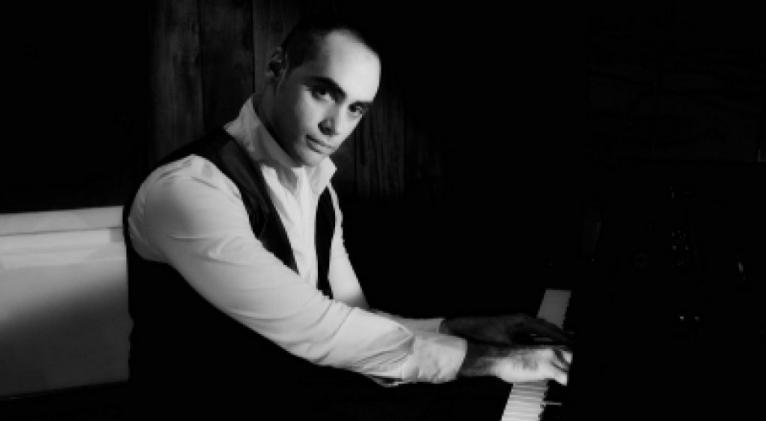Cuban pianist Marcos Madrigal misses cassava with garlic sauce

The outstanding Cuban instrumentalist deploys these days a cultural bridge between Europe and Cuba: The Classical Havana Festival (El Festival Habana Clásica), which brings together important performers of both shores.
One is tempted to ask Marcos Madrigal if he ever gets bored of playing the piano. Should we count the number concerts he gives annually, in big and mid-sized cities around the world (there are long seasons in which he plays every day in front of very demanding audiences), should we add his rehearsal and study hours to guarantee the quality of his concerts; should we take into account the sessions at recording studios, plus the informal moments he shares with friends and admirers before the keys…., it wouldn’t be insane to think that the piano is the first thing in his life… and that everything else is secondary.
But Marcos Madrigal does not seem obsessed. His relationship with the instrument is that of a well-run marriage.
The Cuban, who as a student already admired professors and the audience for his gifts, has become a renowned pianist on the European circuit. And everybody knows or should figure out how complicated it is for someone to make a place in that circuit.
These days, Marcos Madrigal was in Havana, his city. He’s the main organizer of the Classical Havana Festival, which second edition is running in the main concert halls of the historic core of the Cuban capital. It’s a luxury festival; its programming, its announcement are quite up to the standard of events of that kind in the great epicenters of the universal music.

Madrigal, who has lived in Italy for years, brought with him a contingent of top-rated musicians to get them together with some of the most talented instrumentalists living in Cuba.
You may suppose that Marcos Madrigal does not have enough time for interviews, but giving interviews is also part of the very intense agenda of a renowned pianist.
You were born in a mythical city, Havana, and now live in the eternal city, Rome….
“Certainly, since long ago it has become my other home, the core of my job, everything I do in Europe and in the rest of the world. Let’s say that I am always between Rome and Havana. Creating and being me”.
And how have you managed to insert yourself into a musical panorama as selective as the European one?
“First of all, working without a break. Showing the quality of my training. It was a surprise for me that the European classical circuit opened its doors to me in such a welcoming way, notwithstanding I am a Caribbean pianist. And certainly, I think I’ve managed —despite, but also thanks to my origin— to grab a place in the movement of classical pianists in Europe”.
“In the end, the Caribbean and Cuba, in particular, have helped me, they have identified me: it is what I represent in that very broad movement of contemporary piano”.

Is there room for Latin American repertoire in Europe? To what extent does coming from this part of the world and developing a career in the other entail a responsibility for the artist?
“I’ve never turned my back on the culture of my country and my continent. I couldn’t do it, even if I intended it. As a classical pianist I have a standard repertoire, but for several years I’ve made up a project that promotes unique expressions of the Latin American repertoire for piano. Incredibly, all that great heritage is still very little known in Europe: there’s little dissemination and very little discography”.
“You can figure out it is a huge project and it will take many years. But I’ve already started and I feel very proud to be part of it. The second album of this endeavor, which is dedicated to Brazil, will be released soon. We’re preparing one on the Argentine repertoire”.
And Cuba specifically? How is it inserted into your daily proposal?
“It’s my life, it’s like my backpack of experiences that accompanies me and that I show to the general audience. Before musicians, we are artists, and before artists, humans. So, the Cuban being is present when I play music by Beethoven, by Schumann or by the very same Lecuona”.
“My training, after Cuba, has continued in both Europe and Russia, but I am still me. Marcos Madrigal is Cuban, it is impossible to disconnect or ignore who I am, where I come from, when it comes to playing classical music”.

What do you find in Cuba? What do you miss from Cuba?
“I miss everything. Although I come a lot, and I am in permanent contact, I miss everything. From the cassava with garlic sauce to my sea, my Seawall (Malecón). My streets, my corners. And of course, the people, my people: my family, my friends, that’s the main thing”.
“I am always linked to my country, to my city, wherever I am in the world. When I play here, I feel it is my place. I do not take it on as an obligation, but as the greatest pleasure. I will always come back”.
Translated by Jorge Mesa Benjamin / CubaSi Translation Staff













Add new comment